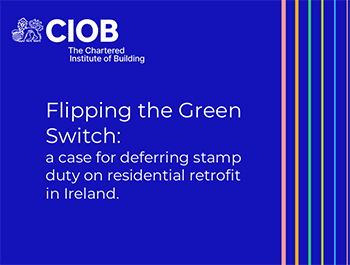CIOB proposes stamp duty deferral on fixer uppers in RoI and NI
With energy saving high on the priority lists of public and governments alike, a paper published by the Chartered Institute of Building (CIOB) explores how deferring stamp duty on properties bought, made more energy efficient and sold on, could help get more homes up to scratch sooner.
The proposal aims to encourage investors to fix up older, less energy efficient homes for resale by allowing them to defer stamp duty, thereby creating a ‘green flipping’ business model. This could provide an additional incentive to retrofit and increase the overall number of residential properties becoming more energy efficient through improved loft and wall insulation, better windows and doors and new boilers for example - good news for bill paying residents and decarbonisation commitments.
To defer the stamp duty, investors would have to have their retrofitting measures carried out and verified by suitably qualified professionals and would be required to sell on the property once work is complete. They would not be able to live it in themselves or rent it out.
Contents |
[edit] Comment
Joseph Kilroy, policy and public affairs manager for Ireland at CIOB, said: “The residential sector is proportionally the highest contributor to the built environment’s carbon emissions, a sector which is itself is responsible for almost half of national emissions. Plus, in a cost-of-living crisis with no end in sight, every possible effort must be made to reduce household energy bills.
“Our proposal in isolation will not achieve a sufficient reduction in residential emissions. However, as part of a package of measures, it could provide a stimulus to counter the stubbornly low number of residential retrofits happening in Ireland and Northern Ireland. “This measure isn't the panacea to addressing energy efficiency in the built environment, however, it goes someway to improving quality whilst enhancing energy efficiency and making better use of a tax that has been seen to be inefficient. Evidence relating to other stamp duty changes, such as the holiday period during the Covid-19 pandemic, suggests that the market reacts to such changes so this proposal could potentially underpin a much-needed new source of residential retrofit.”
John Barry, Professor of Green Political Economy at Queen’s University Belfast, said: “The failure of COP 27 in Egypt makes it more pressing for innovative policy proposals to meet climate and decarbonisation targets. A key and under-explored area are non-technological policy ideas, such as the insulation of buildings. In the context of the worsening cost of living crisis, addressing the linked climate crisis via retrofitting buildings would deliver multiple benefits, yet there is a serious problem in meeting retrofitting targets in the residential sector. This report, proposing the deferral of stamp duty on residential properties purchased for refurbishment, would go a long way to helping the speed and scale needed to decarbonise the domestic housing stock in Ireland, north and south.”
[edit] Ireland and Northern Ireland energy facts
[edit] Ireland
In Ireland the built environment sector accounts for 37% of the country’s carbon emissions
Heating, cooling, and lighting buildings – operational carbon - accounts for 23% of national emissions
Less than 25% of the housing stock is A or B rated.
[edit] Northern Ireland
In Northern Ireland residential operational emissions account for 13.7% of national emissions, primarily due to the use of fossil fuels for domestic heating
The combination of the condition of the housing stock and the sources of energy used for residential fuel means that Northern Ireland has an acute problem when it comes to residential operational emissions.
According to the 2016 Northern Ireland House Condition Survey – the latest available data – Northern Ireland’s housing stock had 61,000 dwellings deemed below the Decent Homes Standard, 160,000 dwellings in fuel poverty, and 50% of dwellings were rated below the EPC target Band C.
Read the full CIOB report here.
This article appears on the CIOB news site as "CIOB proposes stamp duty deferral on fixer uppers in RoI and NI"
--CIOB
[edit] Related articles on Designing Buildings
- Stamp duty land tax SDLT.
- Duty.
- Net Present Value.
- Retrofit.
- Refurbishment.
- Renovation.
- Renovation v refurbishment v retrofit.
- Retrofit and traditional approaches to comfort.
- Retrofit coordinator.
- Retrofit, refurbishment and the growth of connected HVAC technology.
- Search fees.
- Tax on £2m plus residential properties.
- Taxation.
Featured articles and news
Infrastructure that connect the physical and digital domains.
Harnessing robotics and AI in challenging environments
The key to nuclear decommissioning and fusion engineering.
BSRIA announces Lisa Ashworth as new CEO
Tasked with furthering BSRIA’s impressive growth ambitions.
Public buildings get half a million energy efficiency boost
£557 million to switch to cleaner heating and save on energy.
CIOB launches pre-election manifesto
Outlining potential future policies for the next government.
Grenfell Tower Inquiry announcement
Phase 2 hearings come to a close and the final report due in September.
Progress from Parts L, F and O: A whitepaper, one year on.
A replicated study to understand the opinion of practitioners.
ECA announces new president 2024
Electrical engineer and business leader Stuart Smith.
A distinct type of countryside that should be celebrated.
Should Part O be extended to existing buildings?
EAC brands heatwave adaptation a missed opportunity.
Definition of Statutory in workplace and facilities management
Established by IWFM, BESA, CIBSE and BSRIA.
Tackling the transition from traditional heating systems
59% lack the necessary information and confidence to switch.
The general election and the construction industry
As PM, Rishi Sunak announces July 4 date for an election.
Eco apprenticeships continue help grow green workforce
A year after being recognised at the King's coronation.
Permitted development rights for agricultural buildings
The changes coming into effect as of May 21, 2024.























